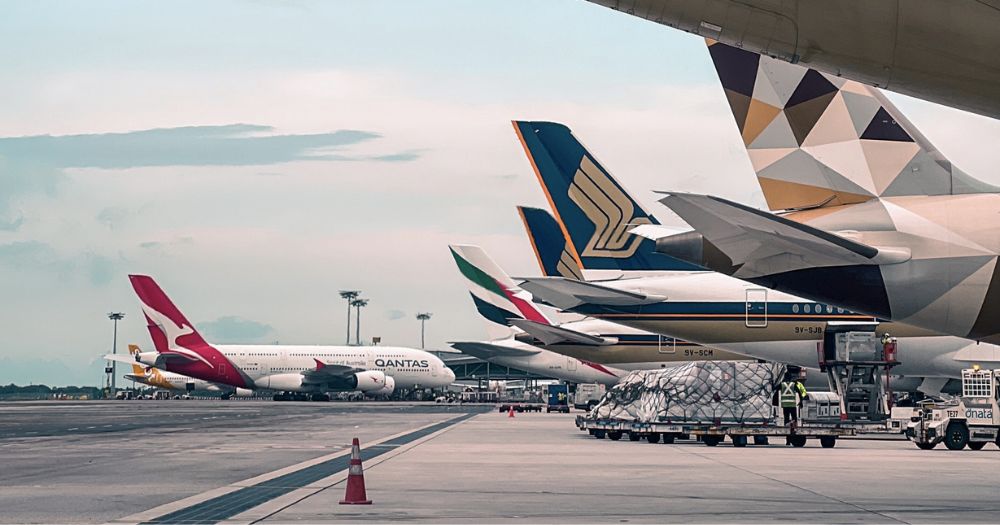Follow us on Telegram for the latest updates: https://t.me/mothershipsg
A new S$50 million aviation sustainability programme will be set up to support Singapore’s drive to develop a sustainable air hub.
The announcement, made by Minister for Transport S Iswaran, was among several other decarbonisation announcements the transport ministry made during its Committee of Supply (COS) debate on Mar. 3, 2023.
To fund sector-wide and company-level projects
The S$50 million programme will "support feasibility trials and research studies, and bring stakeholders together to create innovative solutions for a more sustainable air hub," said Iswaran.
It will provide up to 70 per cent funding for sector-wide projects and up to 50 per cent funding for company-level projects, according to the Civil Aviation Authority of Singapore (CAAS).
The programme will fund projects that deliver one or more of the following key thrusts:
- Projects that reduce energy use and demonstrate a potential sizeable carbon emission reduction of at least 10 per cent for the process or activity targeted.
- Efforts that enhance companies’ capabilities in deploying sustainability solutions as well as develop and test-bed new service offerings.
- Projects that bring ecosystem partners together to collaborate on research and development, green certification or standards development and foster knowledge transfer.
Examples of projects the programme could support include:
- Adoption of novel or more energy-efficient airport systems and/or equipment,
- Optimisation of airport processes to enhance operational efficiency and sustainability of key processes, such as reducing aircraft turnaround time or improving airside vehicle movements, and
- Transition to cleaner energy sources such as testing of new alternative or low carbon fuels.
“Coming out of the Covid-19 pandemic, we want to build sustainability as a new competitive advantage for the Singapore air hub," said Han Kok Juan, Director-General of CAAS.
CAAS will be conducting the first call for proposals from Apr. 1 to Apr. 30, 2023.
Airside vehicles in Changi will run on cleaner energy by 2040
Iswaran also announced that all airside vehicles in Changi Airport will run on cleaner energy by 2040.
This refers to the section of the airport beyond customs control such as the airport aprons, runways and taxiways.
"Currently, close to 20 per cent of around 2,500 airside vehicles at Changi Airport are electric," he said.
From 2025, all new light vehicles at Changi's airside, such as cars, vans and minibuses, must be electric.
To support the fleet, Changi Airport Group has installed about 100 electric vehicles (EVs) charging stations and will increase this to more than 300 over the next few years.
Certain new heavy vehicles like forklifts and tractors, for which viable electric models are available, will also be required to be electric from 2025.
"We will commence trials on the use of renewable diesel, especially for specialised airport ground handling vehicles where there are no electric models," added Iswaran.
Harbour crafts required to decarbonise
The harbour craft sector will also be required to achieve net-zero emissions by 2050, announced Iswaran.
"To achieve this transition, from 2030, all new harbour craft operating in our port waters must be fully electric, be capable of using B100 biofuels, or be compatible with net-zero fuels such as hydrogen," he said.
This will apply to about 1,600 harbour craft currently licensed by the Maritime and Port Authority of Singapore (MPA).
To meet the 2030 requirement, MPA encourages the industry to consult with them on the owners' harbour craft designs early.
The consultation process will be a compulsory requirement from 2027, said MPA.
MPA will lower the cost of adoption and mobilise support for early adopters by working with the industry, financial institutions, harbour craft operators and manufacturers, said Iswaran.
MPA will call for proposals in the second quarter of 2023 for the design and development, demand aggregation and green financing for new electric harbour craft.
"Pleasure craft sector and domestic tug boats will also be required to achieve net-zero emissions by 2050. MPA is studying the timelines for the transition given their different power requirements and will provide an update next year," said Iswaran.
Extended grant for EV chargers in condominiums
EV adoption has also been healthy, noted Iswaran in his speech.
In 2022, electric cars formed 11.8 per cent of all new car registrations, more than three times of the 3.8 per cent in 2021.
The islandwide deployment of EV chargers was "brought forward to address range anxiety", Iswaran said.
At the debates, Senior Minister of State for Ministry of Transport Amy Khor said that there are over 3,800 charging points island-wide today, up from 1,500 in 2019.
To support the adoption of electric vehicles, Khor announced that LTA is extending the Electric Vehicle Common Charger Grant (ECCG) by another two years.
The grant, which co-funds charger installation costs in private condominiums, was initially slated to end in December this year, but will be extended until December 2025.
The grant has co-funded the installation of 267 chargers in 107 condominiums to date.
400 more electric buses from December 2024
Towards the goal of having a 100 per cent cleaner bus fleet by 2040, electric buses are expected to make up half of Singapore's public bus fleet by 2030.
To meet this target, LTA will be calling a tender in March 2023 to procure around 400 new electric buses to replace diesel buses that are reaching the end of their statutory lifespan, said Iswaran.
New bus depots will also be completed in tandem to support e-bus operations, he shared.
The procured buses are expected to be deployed for passenger service from December 2024 onwards.
To date, 60 electric buses have been purchased and deployed.
Top image via Changi Airport/Facebook.
If you like what you read, follow us on Facebook, Instagram, Twitter and Telegram to get the latest updates.
